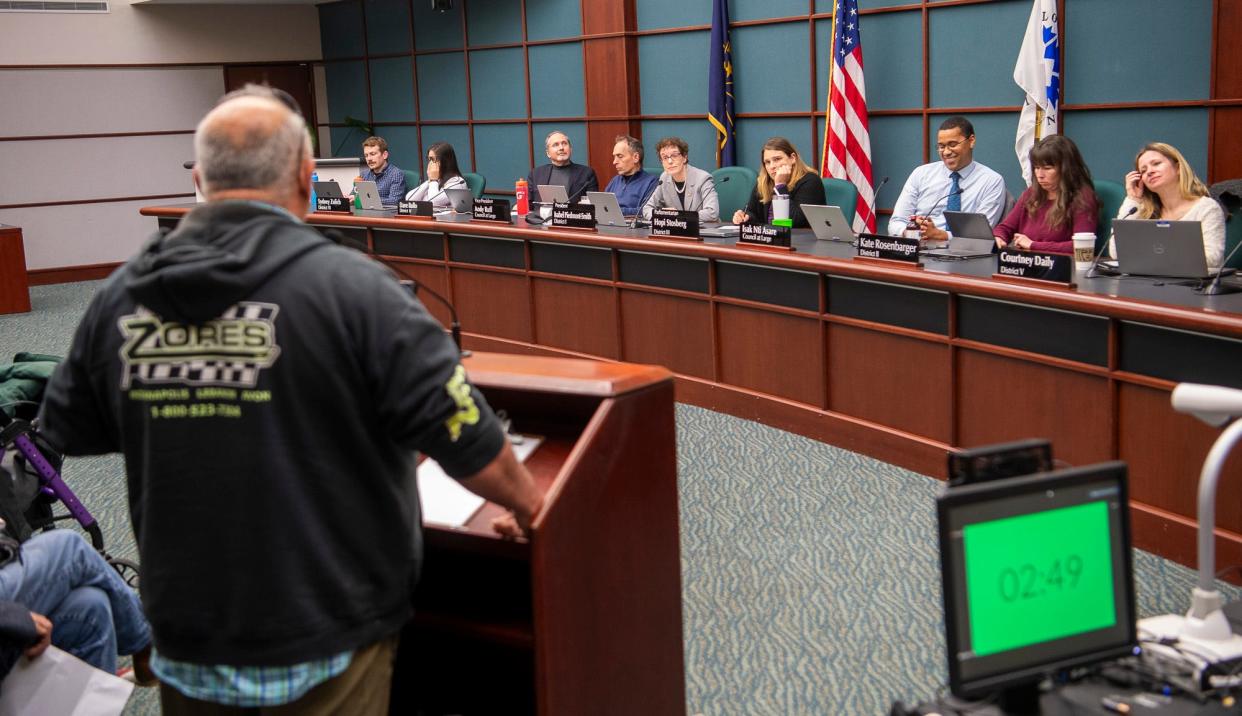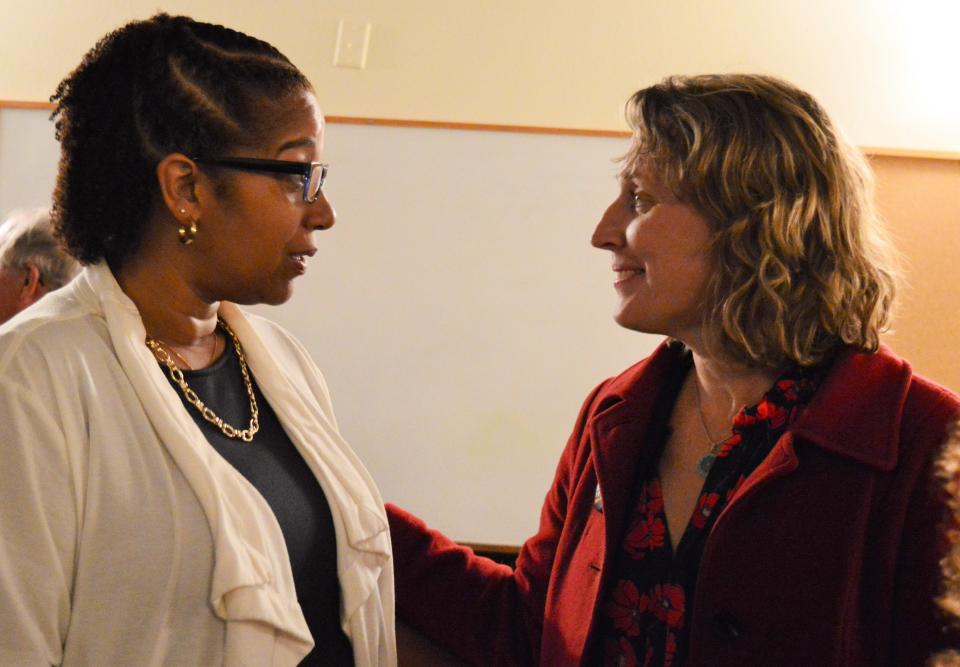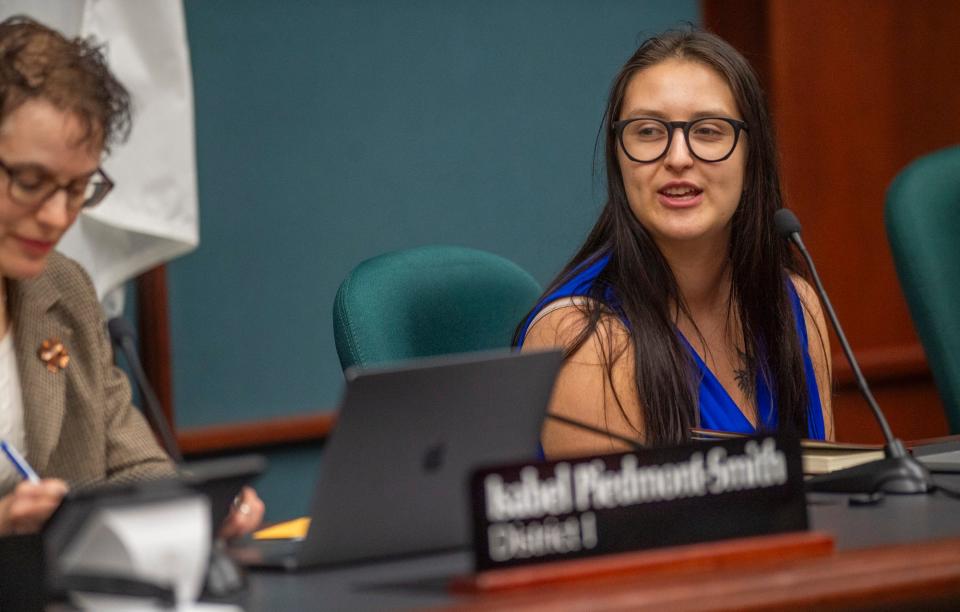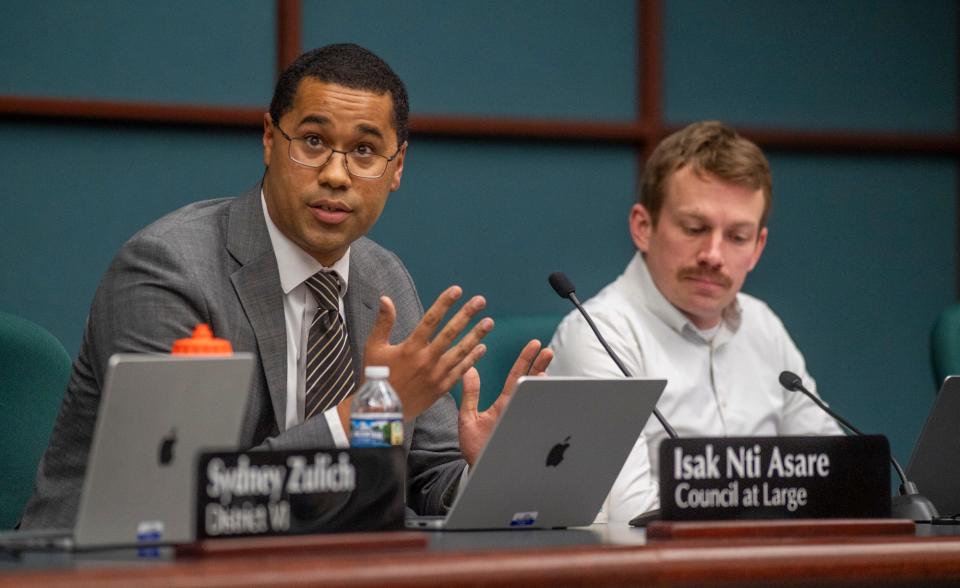After neo-Nazi hate speech, an Indiana city considers changing its public meetings

Editor's note: This story has been updated to correct the start time of the library meeting.
After neo-Nazis uttered hateful comments at a recent meeting, the Bloomington City Council is weighing whether to change long-standing procedures that dictate how people can provide comments in public meetings.
Informal proposals being weighed include time limits, use of technology and requiring people to sign up a day before the meeting and to provide their name, address, contact information and the topic on which they want to speak.
People can provide input on the proposals at three meetings over the next few days:
From 5-7 p.m. Thursday, council members Sydney Zulich and Courtney Daily will host a grieving and brainstorming session at Nick's English Hut, 423 E. Kirkwood Ave.
At 10:30 a.m. Saturday at the Monroe County Public Library, 303 E. Kirkwood Ave., council member Isak Nti Asare and county council member Jennifer Crossley will host a session that is to include Mayor Kerry Thomson and state Sen. Shelli Yoder, D-Bloomington.
At 6 p.m. April 30, the city council will discuss the matter in a work session at city hall, 401 N. Morton St.
Neo-Nazis co-opted the April 3 city council meeting and, via Zoom, uttered antisemitic, anti-LGBTQ and racist hate speech, leaving council members and the mayor in or near tears. The comments came as the council considered a resolution to call for a ceasefire in Gaza. The council adopted the resolution unanimously.
Mayor 'furious,' in tears: Neo-Nazis co-opt Bloomington City Council meeting
Council members condemned the hate speech as “disgusting” — but did so hours after it happened, in part because of council procedures.
Council members addressed the incident in subsequent meetings, with council President Isabel Piedmont-Smith apologizing for not condemning the hate speech sooner.
Bloomington City Clerk Nicole Bolden in last week’s city council meeting asked council members to consider making changes to public comment procedures.

She said the April 3 meeting, during which the neo-Nazis called in, should serve as a reminder that current council procedures do not create opportunities for healthy dialogue.
Bolden, who is Black and queer and in her role as city clerk participates in city council meetings, said council members should have condemned the hateful comments earlier in the April 3 meeting.
“While members of the public had several minutes to speak at length about their belief in white supremacy,” she said, “the council seemed frozen under the weight of its own processes.”
The most hateful comments on April 3 came via Zoom, but Bolden cautioned against inadvertently downplaying the gravity of the verbal abuse by focusing on its likely geographic origins.
“I understand that it may be a comfort to think that the comments made under the veil of anonymity were not really people from or of our community, but the problem with that view is that it ignores the very real impact on those who are listening to the rhetorical violence directed at them,” she said.
Bolden said later that week that she would not ask the council to adopt specific procedures, but would offer possible solutions by which community members can hear from one another while at the same time protect one another.
'Stop being shocked and start getting to work'
Council members, too, have expressed their frustrations.
Zulich, the council’s sole Jewish member, said in an interview, “I think we can admit that this was a traumatic experience for a lot of people involved, including me.”

Zulich said she would encourage the council to explore how it can “prevent hate speech without limiting free speech.”
In a written statement she issued a few days after the April 3 council meeting, she said, “It is clear to me that we do not have the proper procedures in place to protect our people from hate speech and verbal abuse.”
Asare, the council’s sole Black member, agreed.
“This just wasn’t the forum for having this kind of conversation,” he said.
The council needs to figure out a way to create the kind of environment that fosters constructive dialogue and consensus building, especially on potentially divisive matters, Asare said.
He credited the Gaza resolution’s sponsors, Piedmont-Smith and council member Dave Rollo, with seeking input from many diverse stakeholders to build consensus before the meeting. However, Asare said, those conversations should have taken place in open meetings, and the council has to figure out what that might look like.

He said the council might try holding a public meeting and invite people to form small groups to draft their own resolutions and then to compare, contrast and refine. Asare said that approach might yield a resolution that might not please everyone, but where people will feel as though they have had a chance to participate.
He said the council will have to have other difficult conversations and should not shy away from them, but members need to think very clearly about the tools at their disposal to avoid providing a platform for racism and prejudice.
“We don’t have the mechanisms to stop this once it starts,” he said.
Asare also said people need to stop being shocked when they see racism and bigotry. They need to stop acting as though it’s an exception, he said.
The shock and outrage people express when racism and bigotry bubble to the surface really undermines those members of the community who say they’re experiencing that hatred with regularity, Asare said.
“Those of us who live it have been seeing it all along,” he said. “Stop being shocked and start getting to work.”
Boris Ladwig can be reached at bladwig@heraldt.com.
This article originally appeared on The Herald-Times: After neo-Nazi hate speech, an Indiana city considers changing its public meetings

